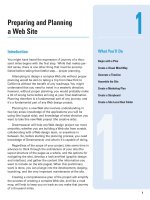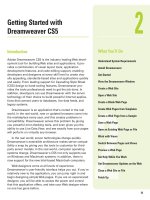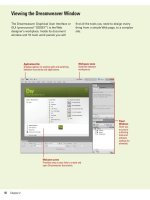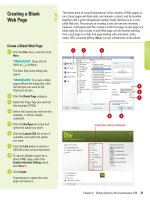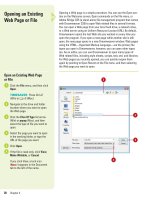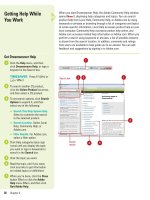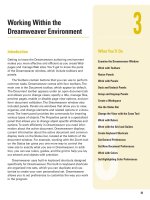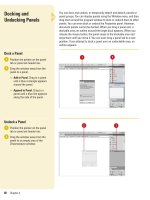adobe dreamweaver cs5 on demand part 27 ppsx
Bạn đang xem bản rút gọn của tài liệu. Xem và tải ngay bản đầy đủ của tài liệu tại đây (720.62 KB, 6 trang )
ptg
Adding an http link to a Web page is a relatively simple and painless
operation. You will need to decide what to use for the link (text, graphic,
animation), what you are linking to (Web page, site, etc), and the cor-
rect path to the destination (URL or Uniform Resource Locator). Once
you've answered those questions, it's a simple matter of opening
Dreamweaver and getting to work. In this example, you're creating a
simple text link that will connect the active Web page to the index page
on another site.
Adding a Link
Add a Text Link
Open the Web page that you want
to add the link.
Enter or select the text that you
want converted into a link, or click
to place the insertion point where
you want the link established.
Click the Insert menu, and then
click Hyperlink.
Use the following options to
convert the text into a link:
◆ Text. If you previously selected
the text, it appears in this
window. If you clicked in the
document to add an insertion
point, you need to add the text
for the link.
◆ Link. Add the path and link
document in the Link Input
window, or click the Browse
button to locate and add the
link.
◆ Target. Click the Target list
arrow, and then select from the
following options:
◆ _blank. Opens the linked
page in a new window.
NOTE
Be careful of this option
because some spam blockers
prevent the opening of additional
windows.
4
3
2
1
168 Chapter 7
2
1
3
5
4
From the Library of Wow! eBook
ptg
Chapter 7 Linking Web Pages 169
◆ _parent. Loads the linked
document in the immediate
frameset of the active
document.
◆ _self. Loads the linked
document in the same
browser window (default).
◆ _top. Loads the linked
document in the topmost
window of a frameset.
◆ Title. Insert the title for the link.
◆ Access Key. Enter a keyboard
stroke (one letter), to select the
link in the browser (optional
shortcut).
◆ Tab Index. Enter a numerical
value to indicate the tab order
of this link, as it relates to all
other links on the page
(optional).
Click OK to add the link to the
page.
In Code view the link would look
like this:
<a href=""
tabindex="3" title="Title Text"
accesskey="f" target"_self">This is
the link text<a/>
5
Use to select
the link file
Linked text in
Code view
Link address appears here
See Also
See “Modifying a Link” on page 178 for
information on changing link settings in
the Properties panel.
Linked text
From the Library of Wow! eBook
ptg
170 Chapter 7
Where would we be without email… or at least that's a question that
was posed to me by one of my students while I was teaching a class on
communications. I will have to admit, e-mail is a big part of our commu-
nications structure. You see it everywhere you go: a patron in a restau-
rant emailing their spouse on the quality of the roast beef, kids emailing
their friends, who happen to be sitting right next to them in class. Email
is all around us, and Dreamweaver makes the creation of an email link
a veritable piece of baklava, cake. Remember, clicking an email link
requires that the person doing the clicking has a valid email applica-
tion, and a connection to the Internet.
Adding an Email Link
Add an Email Link
Open the Web page that you want
to add an email link.
Enter or select the text that you
want converted into an email link,
or click to place the insertion point
where you want the link
established. In this example, the
appropriate text is selected.
Click the Insert menu, and then
click Email Link.
Create the link using the following
options:
◆ Text. If you previously selected
the text, it will appear in this
window. If you clicked in the
document to add an insertion
point, you will be required to
add the text for the link.
◆ E-Mail. Enter a valid email
address.
Click OK to add the email link to
the page.
5
4
3
2
1
2
1
3
4
5
From the Library of Wow! eBook
ptg
Chapter 7 Linking Web Pages 171
Modify an Email Link
Select the email link in Design
view.
Click the Window menu, and then
click Properties to display the
Properties panel.
Modify the link using the following
options:
◆ Link. Modify the name or path
of the link by changing the link
information, located within the
Link box.
NOTE
If you remove the
information in the Link box,
you remove the link from the
selected text.
◆ Target. Since an email link
opens another application;
leave this field blank.
3
2
1
1
2
3
From the Library of Wow! eBook
ptg
172 Chapter 7
So far, the Web links created simply jump you from one page to
another. When the selected document loads, it places you at the very
top of the page. In most circumstances that's exactly what you want to
happen; however, there are times when you want the page to load, and
then start the visitor in the middle, or somewhere other than the very
top. That's where named anchors come into play. Named anchors are
internal navigation tools that let you select at what part of the page you
want the visitor to start. This is extremely helpful in long scrolling docu-
ments where you can have the page stop at a particular chapter or
paragraph. Named anchors are an HTML anchor tag pair (<a></a>) that
includes a name attribute. The named anchor serves as a target for
links. To create a named anchor, you first place a named anchor on
your Web page, and then create a link that directs the browser to the
specific tag. Named anchors are represented by a small book icon that
appears in the position of the anchor. You can have as many named
anchors as you need in your document and, of course, the correspon-
ding links that direct the browser to the correct anchor.
Linking within a Web
Page
Add a Named Anchor
Open the Web page that you want
to add named anchors.
Click to place the insertion point
where you want the named anchor
established. This is where the
named anchor is coded in HTML.
Select the Insert menu, and then
click Named Anchor.
Enter the name for this specific
anchor (i.e. chapter1, TOC, etc).
IMPORTANT
Named anchors
are case sensitive, and must be
used only once within the
document.
Click OK to add the named anchor
to the document.
Repeat this process to add as
many named anchors as needed.
NOTE
To chang e the nam e of a n
established anchor, simply click on
the book icon and change the
name using the Properties panel.
6
5
4
3
2
1
3
2
Anchor name
1
Anchor icon
4
5
From the Library of Wow! eBook
ptg
Chapter 7 Linking Web Pages 173
Add Links to Named Anchors
Select the text (or graphic) that
you want to use as the link to a
previously created named anchor.
Click the Window menu, and then
click Properties to display the
Properties panel.
Click in the Link box.
Add the pound sign (#), followed
by the name of the anchor (no
spacing between the pound sign
and the name of the anchor).
To test the li nks, click the File
menu, point to Preview In
Browser, and then select the
browser you want to use.
TIMESAVER
If you're using a
lot of anchors, it's not a bad idea
to make a list of the anchors, and
the order in which they appear
within the document. That way you
don't have to hunt for the name or,
worse yet, guess.
5
4
3
2
1
2
1
Did You Know?
You can use the Point To File button to
create a link to a named anchor.
You
can use the Point To File button that
appears to the right of the Link box to
select an anchor (if it appears in
Design view). Simply click the Point To
File button, and then drag it over the
book icon for the name anchor and
release.
4
3
From the Library of Wow! eBook
